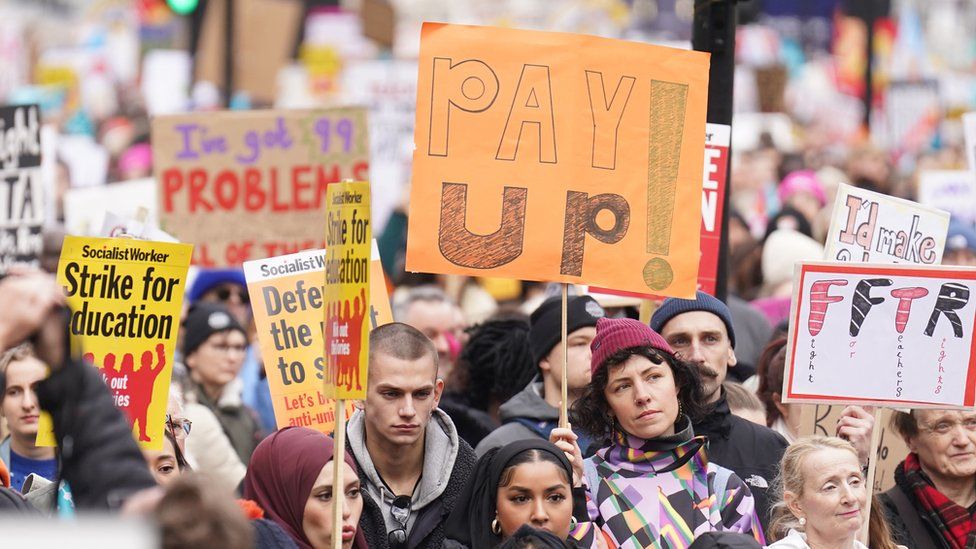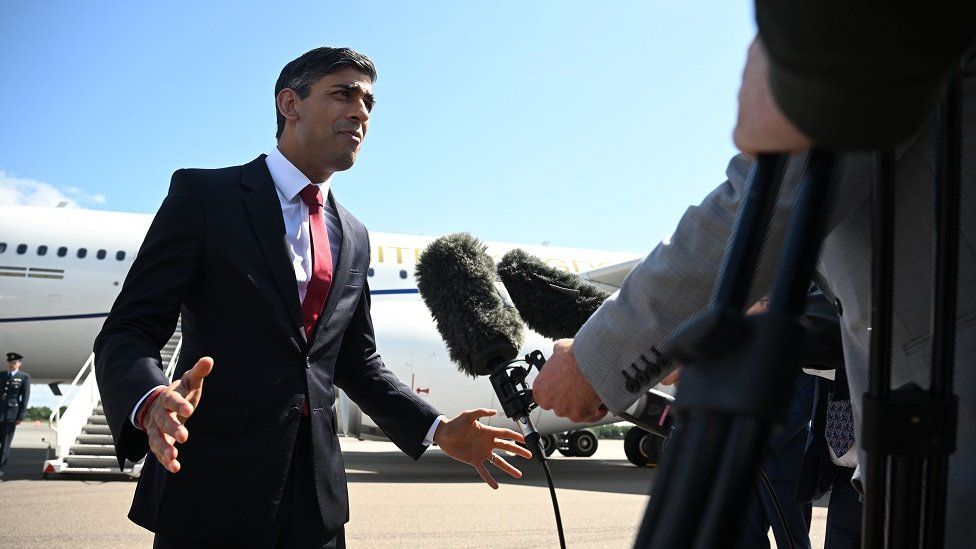
The government is considering pay increases of between 6%-6.5% for public sector workers, the BBC understands.
Official pay review bodies for employees including teachers, junior doctors and police have recommended the pay rise. Inflation to May was 8.7%.
The prime minister and chancellor are expected to meet this week or next to decide whether to accept the rises.
Government sources have told the BBC any rises over 3.5% would need to come out of existing departmental budgets.
There have been reports the Cabinet is split over what to do next. Several cabinet ministers, including the health secretary and education secretary, have pushed internally for the review bodies' recommendations to be accepted, according to the Times.
Mr Sunak says pay awards should be "responsible" to avoid making inflation worse. He has made tackling rising prices his top political priority.
Ministers have had the recommendations from pay review bodies for weeks.
The BBC has been told that all of the independent bodies, which cover a range of jobs, have all recommended pay rises of between 6% and 6.5% percent for public sector workers.
A decision not to accept the recommendations would prompt fresh tensions with unions, raising the prospect of continuing public-sector strikes.
Submissions from departments to the pay review bodies said they could only afford rises around 3.5% from within their own budgets.
But it's expected the PM and Chancellor Jeremy Hunt will tell ministers any awards higher than this will have to be funded through cuts or savings elsewhere in their own departments.
Mr Hunt ruled out funding pay rises with government borrowing, during an interview on ITV1'S Peston.
Increasing public sector pay through borrowing would "pump billions of pounds of extra money into the economy" leading to businesses "putting up their prices" and driving further inflation.
In a speech to leading figures from finance and business at the Mansion House this week, he said: "Borrowing is itself inflationary."
It comes at a time when businesses, as well as households, are being hit by higher costs due to inflation remaining stubbornly high in the UK.

Speaking at a news conference at the Nato summit in Lithuania, Mr Sunak said his decision about pay would be guided by "fairness" to public sector workers and taxpayers, as well as "responsibility".
He said he didn't want to do anything that would "fuel inflation, make it worse or last for longer".
Speaking on Monday during a visit to Avon and Somerset police force, Home Secretary Suella Braverman would not answer directly whether the government should abide by recommendations on public sector pay.
Praising police officers, she said: "They do incredibly heroic work, day in, day out, and they save lives and it's right that we properly reward them for their sacrifice and their dedication.
"We know that there's an ongoing process - it is a decision for the whole of government.
"I don't want to pre-empt that process and the conclusions of that consideration, but it's right that we properly reward frontline police officers and bear in mind that we're in a very challenging situation, economically."
Taxing decisions
Mr Sunak has previously pledged to halve inflation this year to about 5%, as part of his top five priorities since becoming prime minister.
The rate at which prices are rising remained unchanged at 8.7% in May, despite predictions it would fall.
Persistent inflation levels would make it hard to cut taxes before the next election, Chancellor Jeremy Hunt said in an interview with the Financial Times.
But Mr Sunak said he and the Chancellor were "completely united on wanting to reduce taxes for people".
"But the number one priority right now is to reduce inflation and be responsible with government borrowing," he added.

What are pay bodies?
Almost half of public sector workers are covered by pay review bodies, including police and prison officers, the armed forces, doctors, dentists and teachers.
The pay review bodies are made up of economists and experts on human resources, with experience in both the public and private sector and are appointed by the relevant government department.
Their recommendations are not legally binding, meaning the government can choose to reject or partially ignore the advice, but it is usually accepted.
Some agreements have been reached, including a pay settlement for more than a million NHS staff in England.

Related Topics
https://news.google.com/rss/articles/CBMiL2h0dHBzOi8vd3d3LmJiYy5jby51ay9uZXdzL3VrLXBvbGl0aWNzLTY2MTY1MDA20gEzaHR0cHM6Ly93d3cuYmJjLmNvLnVrL25ld3MvdWstcG9saXRpY3MtNjYxNjUwMDYuYW1w?oc=5
2023-07-12 15:37:49Z
CBMiL2h0dHBzOi8vd3d3LmJiYy5jby51ay9uZXdzL3VrLXBvbGl0aWNzLTY2MTY1MDA20gEzaHR0cHM6Ly93d3cuYmJjLmNvLnVrL25ld3MvdWstcG9saXRpY3MtNjYxNjUwMDYuYW1w
Tidak ada komentar:
Posting Komentar